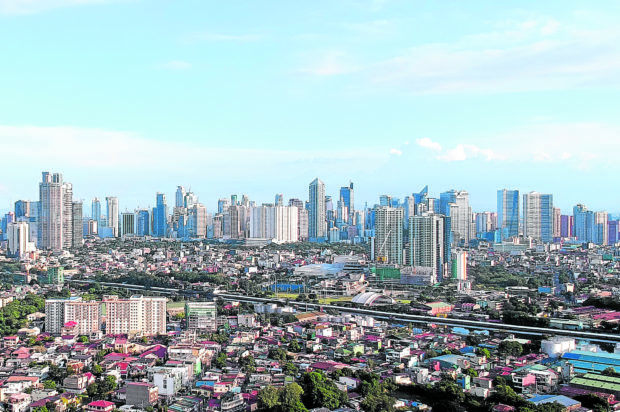
Makati skyline. (File photo by GRIG C. MONTEGRANDE / Philippine Daily Inquirer)
MANILA, Philippines — Secretary Arsenio Balisacan, chief of the National Economic and Development Authority (Neda), backs the proposed Maharlika Investment Fund (MIF) as it would help the country sustain its growth.
“With the Marcos Administration’s Economic Team members, I reiterate my strong support for creating the Maharlika Investment Fund as a complementary vehicle to help us attain the objective of rapid but inclusive and sustainable economic development,” Balisacan said at the “Saturday News Forum” in Quezon City on Saturday.
On Thursday, House Bill No. 6608 – which creates the sovereign wealth fund — was approved, with 279 lawmakers voting in the affirmative while six voted against. No legislator abstained from the voting.
The bill went through many revisions in 17 days since it was first filed as HB 6398.
One of the most salient amendments was the removal of the contributions from the Government Service Insurance System, the Social Security System, and P25 billion from the national budget as sources of the MIF’s seed fund.
The fund sources left are the Land Bank of the Philippines, the Development Bank of the Philippines, and dividends of the Bangko Sentral ng Pilipinas.
Also, the president was replaced by the finance secretary as chair of the fund’s governing board.
MIF to bankroll infra projects
Balisacan said the fund could bankroll infrastructure projects, saying there was a need to invest in logistics and transportation networks critical to supply chains, especially for the agriculture and manufacturing sectors.
“Investments in key infrastructure projects will be supported by innovative finance,” Balisacan said. “With sufficient governance safeguards to ensure the fund’s sustainability and responsible management, the proposed Maharlika Investment Fund will help support our country’s infrastructure development.”
Balisacan said this goal in infrastructure is in line with the Philippine Development Plan (PDP) 2023-2028 approved by President Ferdinand Marcos Jr.
The PDP aims to increase gross domestic product growth and reduce inflation, the unemployment rate, and the country’s poverty incidence, among others.

